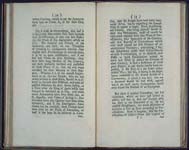Robins, Benjamin
Observations On the Present Convention with Spain. London. 1739. 60 pp. This unusual work bears a calf backed binding with marbled boards, and a recent leather label. An armorial bookplate is located on the inside front cover.


This historical work discusses the Treaty of El Pardo, signed on January 14, 1739, which is printed in full. At the convention described in this volume England and Spain agreed to avoid war, to meet in conference to settle their respective pretensions to American trade and navigation, and to discuss the borders of Florida, Georgia and the Carolinas. Furthermore, by this treaty Spain agreed to pay 95,000 pounds in damages to the South Sea Company. The two powers did enter into conflict later that year, however, when the War of Jenkins Ear erupted in October. The hostilities were precipitated by an incident that took place in 1738 when Captain Robert Jenkins appeared before a committee at the House of Commons and exhibited what he alleged to be his own amputated ear, cut off in 1731 in the West Indies by Spanish coast guards who boarded his ship, pillaged it, and then set it adrift. Public opinion in England, previously aroused by other Spanish outrages, was swiftly exploited by members of Parliament who were in opposition to the government of Robert Walpole.
Robins, born in Bath in 1707, showed an early aptitude for mathematics and relocated to London to continue his studies. His brilliance at mathematics was proven by his demonstration of one of Newton's theories and by a confutation of a dissertation by Bernouilli. After teaching pure mathematics for several years, Robins explored a new field and became an engineer, devoting himself to river navigation and the construction of mills and bridges. Robins published several pamphlets on mathematical and engineering topics in the 1730s and also wrote three political pamphlets in the Tory interest, including Observations. These publications brought Robins political notice and he was appointed to a secret committee reporting to the House of Commons. The function of this group was to examine and report on the past conduct of Walpole. Robins' interests spread to weaponry and in 1742 he published his best known work, New Principles of Gunnery. Robins invented the ballistic pendulum, used for the measurement of velocity of a projectile and he was admitted as a fellow to the Royal Society in 1747. In 1749, Robins accepted an engineering position with the East India Company and sailed to Madras. He became ill from fever and died there in 1751.
The treaty signed at El Pardo was formulated and executed in an attempt to settle differences that arose between the two crowns. Robins quotes and discusses each of the five articles of the treaty. Article II specifies that no new fortifications or posts will be developed in either Carolina or Florida. Robins states that this article is very prejudicial to the interests of England because a very large tract of land in South Carolina, which was purchased with public money as a frontier area, is situated perfectly to be used in defense of the other colonies from a Spanish incursion. Robins argues that England has no intention of invading the Spanish area, but the reverse may not be true:
For it must be remembered, that tho' it is stipulated, that neither Side shall increase their Fortifications, or take any new Posts; yet the whole of this Agreement affects us only. We demand not Florida of the Spaniards, nor have we any Thoughts of invading it, consequently whether they neglect their Fortifications or increase them, it is to us quite indifferent¼.Whereas it is of the utmost Importance to us, that our People, who are but newly arrived in these Parts, should be at liberty to increase their Defences, and take all Measures for their future Safety¼at least it has been so far believed in Carolina, that the People have very lately been under Arms, hourly expecting the Spanish Fleet to appear in Sight.